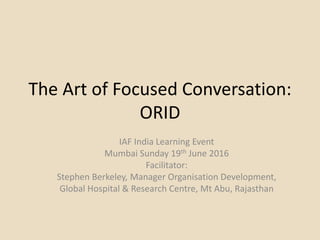
The Focused Conversation Method - ORID
- 1. The Art of Focused Conversation: ORID IAF India Learning Event Mumbai Sunday 19th June 2016 Facilitator: Stephen Berkeley, Manager Organisation Development, Global Hospital & Research Centre, Mt Abu, Rajasthan
- 2. OBJECTIVES To introduce the background and theory behind Focused Conversation - ORID To introduce four levels of ORID To demonstrate ORID by leading a focused conversation To share examples of the application of ORID and its limitations For participants to consider their own applications of ORID
- 5. Objective Focused Conversation When we process information and think clearly, we move through four different modes, sometimes very quickly. These modes of thinking can be labeled: • Objective • Reflective • Interpretive • Decisional ORID Reflective Interpretive Decisional Source: Cynthia Lapp http://ispimi.org/images/meeting/082212/focused_conversation_univ_minnesota.pdf
- 6. ORID is based on the way the brain ORID simply provides a structure for asking questions in that sequence Takes in information Makes sense of it And moves to action Experience Emotion Thought Action O R I D Perception Response Judgment Decision
- 7. Objective Focused Conversation This is the sensory mode of thinking, where we process “raw” data: • What we perceive through our body and senses • Facts and data about the situation • External/Observable information Objective Mode Reflective Interpretive Decisional Source: Cynthia Lapp http://ispimi.org/images/meeting/082212/focused_conversation_univ_minnesota.pdf
- 8. Objective Focused Conversation This is our immediate response to these data, how we are processing the Objective level internally: • How we respond to these “raw” data • What experiences we can relate to these data • Internal response to external data • Images, feelings, memories, associations Reflective Mode Reflective Interpretive Decisional Source: Cynthia Lapp http://ispimi.org/images/meeting/082212/focused_conversation_univ_minnesota.pdf
- 9. Objective Focused Conversation This mode is about processing these responses, experiences and associations: • So what does this mean? • What values are activated? • What is the significance? What are the implications? • What are our insights? Interpretive Mode Reflective Interpretive Decisional Source: Cynthia Lapp http://ispimi.org/images/meeting/082212/focused_conversation_univ_minnesota.pdf
- 10. Objective Focused Conversation This mode is about making decisions or choosing actions based on the information, its meaning and significance: • What are the next steps? • What actions are appropriate? • What has been learned? What is my commitment? Decisional Mode Reflective Interpretive Decisional Source: Cynthia Lapp http://ispimi.org/images/meeting/082212/focused_conversation_univ_minnesota.pdf
- 11. Strategic Questions Source: “Learning from Experience Through Executive Coaching” © Maltbia, Ghosh and Marsick (2010)
- 13. Objective •Senses Reflective •Heart Interpretive •Head Decisional •Action Source: Martin Gilbraith http://bit.ly/29bd8xH
- 14. Objective •What Reflective •Gut Interpretive •So What Decisional •Now What Source: http://www.stakeholder.ca/facilitators-do-it-in-groups
- 15. ORID
- 16. Rational & Experiential Aims Rational Aim • What does the group need to know, understand or decide Experiential Aim • What experience do we want our participants to have Rational Aim • To learn something about each other, facilitation and the role of the facilitator Experiential Aim • To experience ORID in the ToP Focused Conversation method Theory This Conversation Source: Martin Gilbraith http://bit.ly/29bd8xH
- 17. Video “What do Facilitators Do” https://www.youtube.com/watch?v=UDLGjKBHSXg
- 18. OBJECTIVElevelquestions 1.What words and phrases do you recall from the clip? 2.What images do you remember? 3.What people or characters? 4.What else about the clip did you notice, such as sound, colour, design? Source: https://martingilbraith.com/2013/12/18/three-dimensions-of-the-facilitator-role-a-focused-conversation/
- 19. 1.What particularly surprised or intrigued you in the clip? 2.Which ideas were most familiar to you? 3.What reminded you of your own experience of meetings that you have designed and facilitated, or participated in? 4.What other metaphors for facilitation come to mind for you? REFLECTIVElevelquestions Source: https://martingilbraith.com/2013/12/18/three-dimensions-of-the-facilitator-role-a-focused-conversation/
- 20. 1.How well do these three metaphors capture the role of the facilitator in your experience? What would you add? 2.Which of these three dimensions is best understood and appreciated in your own situations? 3.What aspects of the facilitator role would you most like to learn and practice more? How? INTERPRETIVElevelquestions Source: https://martingilbraith.com/2013/12/18/three-dimensions-of-the-facilitator-role-a-focused-conversation/
- 21. 1.What is one insight from this clip or conversation that will you take away and apply in your own work and how? 2.Who would you like to share this clip with? DECISIONALlevelquestions Source: https://martingilbraith.com/2013/12/18/three-dimensions-of-the-facilitator-role-a-focused-conversation/
- 22. Examples of Applications Conversations for interpreting information Conversations for evaluating and reviewing Conversations for coaching & mentoring Conversations for planning
- 23. Strengths of ORID 1. Allows the group to move easily and quickly to a deeper discussion level. 2. May be used to effectively discuss difficult or tense issues. 3. Allows for careful progression for collective consciousness to take place. 4. Enables group to discuss important topics in a non- confrontational style. 5. Sets a clear and strategic context for a topic. Source: https://asiafoundation.org/resources/pdfs/11TechnologyofParticipationTOP.pdf
- 24. Limitations of ORID 1. It may not yield a consensus. 2. Effective only for specific and commonly shared topics. 3. Effective only for short periods of time - difficult to go beyond 45 minutes without losing the group's attention. 4. Verbal method - no visuals or kinesthetic to engage participants. 5. Requires all participants to carefully pay attention and track all comments Source: https://asiafoundation.org/resources/pdfs/11TechnologyofParticipationTOP.pdf
- 25. ACKNOWLEDGEMENTS 1. Barbara MacKay, Yvonne Yam & Lillian Wang for sowing the ORID seed at “Meetings that Rock” #IAFASIA15 preconference workshop 2. Kimberly Bain for suggesting “The Art of Focused Conversations” by ICA Canada 3. Martin Gilbraith for expanding my mind re possibilities of ORID & the ORID questions for the video 4. Beatrice Briggs, International Institute for Facilitation & Change (IIFAC) for “What do Facilitators Do” Video www.iiafc.org 5. Twitter, where I connected with Martin and it was through him I was connected to Beatrices work
Editor's Notes
- Our brain processes information in this sequence: Experience, emotion, thought and action
- The foundation of ORID is questions and listening
